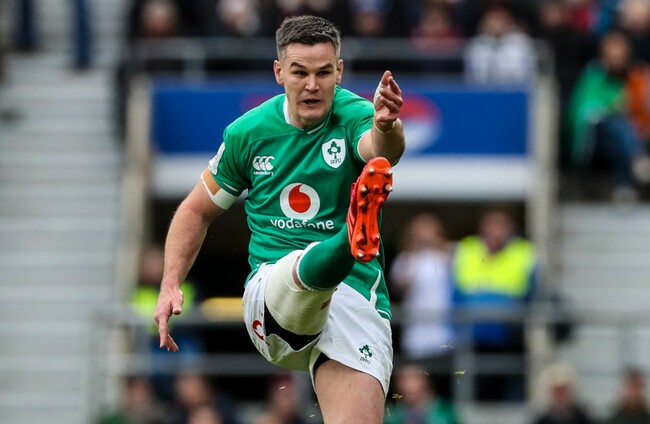HERO ONE WEEK, villain the next. That’s they way of it for out-halves in international rugby.
The 10, particularly one who is also primary goal-kicker, takes marquee billing in the team.
So they take the lion’s share of acclaim when, say, there’s a last-gasp drop-goal. And they carry the burden of expectation, taking the brunt of its weight when things go awry.
When a player in that position then becomes captain, and is in situ for an Irish hammering in Twickenham, the weight can only be multiplied.
Jonathan Sexton may not have been willing to admit – publicly, in the immediate aftermath, at least – that he had a particularly bad day at the office last Sunday, but few would seriously suggest it was anything more than a blemish for the 2018 World Player of the Year.
As a captain, Sexton has demonstrated sharp communication and his performances in Six Nations rounds one and two certainly were not diminished by the weight of maximum responsibility.
It’s just that playing the World Cup finalists on their own turf was, in the words of Leo Cullen, ‘a tough day at the office for everyone’ – and then the sight of heavy strapping would leave you wondering how fit he was for the task.
“He has such a bank of rugby intellect,” Cullen says of the man who is captain of his and Ireland’s team, “he’s a fierce competitor who wants what is best from the teams he is playing in. He is still performing to an incredibly high level.”
The ‘still’ in Cullen’s response here comes because any questions around Sexton’s ability invariably return to his age.
It’s an easy metric to turn to when more nuanced aspects like game management, organisation and decision-making can’t be pinned to a number. Yet Sexton will turn 35 on the day Ireland meet Australia in the last match of this long season on 11 July.
Another digit on the dial does not necessarily bring him another year past his prime.. Cullen’s predecessor as head coach, Matt O’Connor, once quipped that the lock knew his way around the field ‘and knew the short-cuts to most parts as well’.
The former second row experienced his own period of decline and diminished powers before his retirement. Yet the Leinster boss stresses that it needn’t be a necessary evil. It’s position-dependent for most.
“In certain positions it’s more obvious when players lose speed, that can effect performance. In other areas, it may not matter if you have a better engine, speed endurance or physical endurance…
10s are like quarter-backs. You look at Tom Brady and people have been writing him off for 10 seasons and now he is 42, still proving people wrong. Johnny sees himself in that mould.
“The ability to think earns you time and saves your legs. You see Roger Federer still being able to compete against athletes in their prime – whatever that prime really is. There’s a mental prime that comes with age and having done it. And there’s a real value in having that in certain positions.”
Federer and individual athletes are problematic examples, but Brady’s case is applicable because the Patriots (now linked elsewhere) star needs manifold parts in front of him to be in working order to make the all-important connections he has made his name on.
Sunday at Twickenham was a day when Ireland had too few men performing at their peak and too many others over-powered.
Ronan O’Gara often used to opine: ‘when the team goes well, the 10 goes well’. Both suffer when the other falls short.
We wouldn’t be human if our eyes were not drawn to the leader of a beaten team for explanation. For Cullen, the same leader is the man to guide Ireland’s rejuvenation against France.
“It’s a common script, isn’t it? As players from any sport get that little bit older, people are sort of waiting for the downfall to happen,” says Cullen.
“The two games in the Aviva had some very positive noises coming out of it. So it depends on what day of the week you’re listening to the narrative.”









Impressive info given the spread of matches that has to be covered. Keep it up please !!